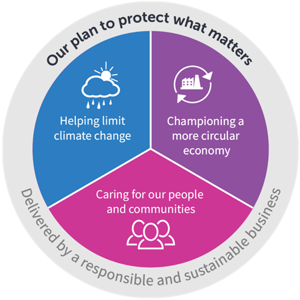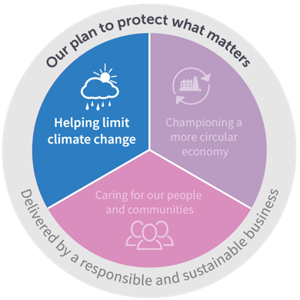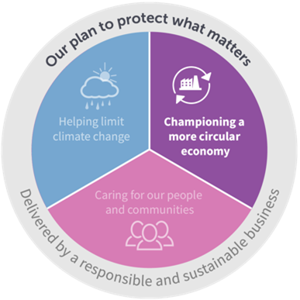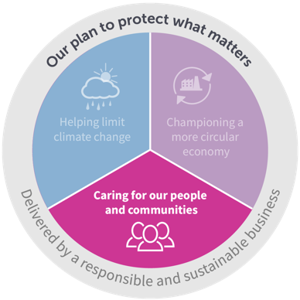
Our sustainability strategy reflects the areas where we can have a positive influence, leveraging our business strategy to positively impact our environment and stakeholders.
Helping limit climate change

As the world’s environmental challenges continue to grow, our plans to act against climate change have never been more critical. And though we can’t tackle this alone, we have an important role to play. This includes both in our business and among our partners and customers. Together, we can enhance our collective resilience to climate challenges.
Understanding our decarbonisation potential
In July 2024 we submitted our letter of commitment to the Science Based Targets initiative (‘SBTi’), signalling our intention to set a near-term science-based emissions reduction target. We’ve made some great progress in better understanding our carbon footprint. We conducted a deep dive into our scope 1 and 2 emissions to identify the most relevant decarbonisation levers and the potential associated energy and cost savings. These include potential initiatives across our office spaces, energy use and company fleet.
For our scope 3 footprint, we focused on increasing our understanding of the emissions associated with our purchased goods and services (our supply chain). We performed a supplier maturity analysis of our top 110 suppliers, to understand how mature they are in terms of their climate ambitions and progress. We looked at factors such as whether they have net zero targets or climate-related disclosures. We also analysed their carbon footprint data. On top of this, we’ve gained more insights through an initial lifecycle analysis in FY24, which considered the lifecycle impact of particular appliances within our supply chain.
We also reviewed potential decarbonisation opportunities within other scope 3 categories, including employee commuting and business travel. The next step is to evolve this work into a more detailed and actionable decarbonisation and supplier engagement plan. We’ll work with the business to identify how this can be operationalised in line with our target ambitions.
-
Set and meet our science-based emissions reductions target
-
Calculate and communicate the carbon benefits of repair
-
Empower our customers and partners to adopt more climate-friendly solutions
Championing a more circular economy

There’s increased focus globally on creating a more circular economy. For us, this starts with promoting our ‘repair first’ approach. Beyond that, we’re also considering options like refurbishment and recycling, and how to support our partners with circularity.
Understanding the benefits of our repair first process
To better understand our emissions and our potential contribution to a more circular economy, we’ve been developing a way to estimate the carbon benefits of repair. This method breaks down the lifecycle emissions for an appliance. It then compares the emissions associated with an appliance we protect versus an unprotected appliance – from manufacturing to end of life.
Through this process, we’re learning about emissions ‘hotspots’ in the appliance lifecycle, and the level of influence we have over them. The aim is to improve our understanding of our own emissions profile and better communicate the environmental benefits of our repair first approach with customers and partners. Early findings from our research indicate that on average, the emissions intensity of a single repair is less than 5% of a single replacement. We are continuing to refine our analysis and look forward to sharing our process and insights in the future.
To champion a more circular economy, we want to play a collaborative role with our partners and customers – particularly when it comes to encouraging repair and re-use, or recycling (where appropriate). And we’re looking at how we can do this
-
Champion a repair-first approach in our sector
-
Explore collaboration opportunities within our value chain
Caring for our people and communities

Our people are critical to our ongoing growth and success. We’re building an inclusive culture which empowers people to drive their own success. At the same time, we’re helping them give back to their communities.
Spotlight on inclusivity in our communities
In line with the ‘Belong’ pillar of our People Strategy, we’re focusing on championing inclusivity – so our employees feel valued and respected, regardless of who they are and where they come from. In 2023, we completed an inclusivity audit to help us better understand our current practices and highlight opportunities for further developing an environment that enables true inclusivity. As part of our commitment to promoting an inclusive workplace, we’re focused on raising awareness about different experiences and fostering a sense of belonging.
For more details, please see the people section, of our Annual Report, starting on page 59. It includes information on our initiatives to improve social mobility, flexibility practices, gender representation and pay gap reporting.
-
Further build on the inclusive character of our business
-
Champion social mobility through initiatives and programmes with social enterprises
-
Enable our employees to volunteer in their communities
Delivered by a responsible and sustainable business

Our commitment to responsible and sustainable business underpins everything we do. For this, a culture of good corporate governance is critical. It’s what allows us to succeed in our sustainability strategy and meet our stakeholders’ expectations.
-
Deliver transparent and compliant disclosures
-
Continue to strengthen the security of customer and employee data
-
Promote human rights and ethical business practices
-
Embed resilient, sustainable and responsible supply chain practices
-
Optimise customer experience, while delivering fair value
FY25 areas of focus
Develop a comprehensive decarbonisation action plan in line with our science-based target commitment.
Explore collaboration opportunities with our partners and supply chain, focusing on better ESG data visibility and shared decarbonisation action – as well as enhancing repair, re-use and recycling efforts.
Develop ESG metrics and KPIs, including the associated data and reporting processes, to support our strategy and emerging disclosure requirements.
Adapt our strategic approach to social programmes, including consideration of long-term social impact and how this could be measured.
Identify opportunities to further embed sustainability across existing teams and processes – to strengthen the business-wide approach to sustainability that we believe is necessary for long-term shared value for our stakeholders.
For more about our strategy and progress, see the sustainability section of our latest Annual Report and Accounts.
Consumer attitudes towards re-use and recycling
In November 2023, we carried out a survey of over 3,000 UK consumers with no protection on household items. We wanted to better understand their current practices and attitudes towards repair, refurbishment and recycling.
Affordability and energy efficiency were the top two considerations for those open to purchasing refurbished appliances
Recycling of appliances: 40% of respondents indicated they recycled their old appliance, with the top three reasons for those who didn’t being they sold it or gave it away, they just didn’t consider recycling, they didn’t know how to recycle it
Consumer research like this gives us a better insight into the motivations and challenges of potential customers. It helps improve our understanding of how we can work with our partners and customers to champion a more circular approach with appliances.







